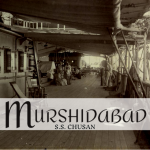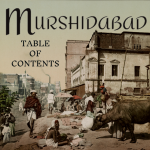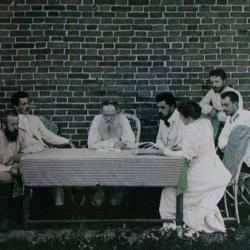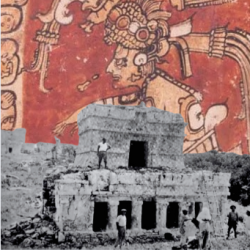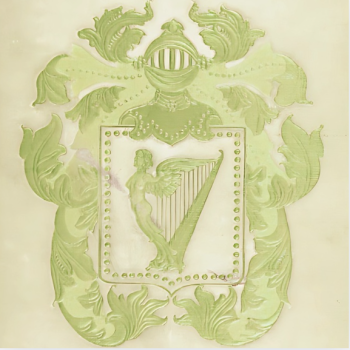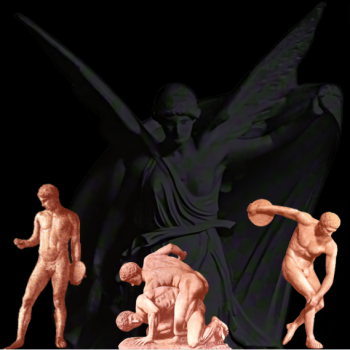EVERYTHING NEAR AND DEAR
Vera Johnston
July 10 1890, Suez Canal. Approaching Port Said.
The endless Suez Canal stretched on. The ditch of dirty water, especially unsightly after the bright colors of the Red Sea, was so narrow that it seemed that there was no way for two medium-sized steamships to pass through it. Nevertheless, steamships were encountered, and very often gliding past the Chusan so slowly that the passengers between on the two vessels had time to talk. One fast steamer of a Greek company, with a cargo of coconuts and bananas, even overtook us. Only here do you clearly realize that the Red Sea is far from being such a narrow puddle as everyone is accustomed to thinking of it, such as how it looks on maps.
The sides of the canal, sometimes lined with bricks, sometimes smeared with imported clay, could barely hold back the pressure of the sands. Occasionally, many miles away, there was a watchman’s house under the sun on a slope. A stunted oleander, or palm tree in the garden, a dog, several chickens. The heat was such that not even the Indian heat, which warped one’s tables into tubes in closed rooms, could hold a candle to it. The double canopy over the steamer only teased the heat, and to spite it, the heat crept even harder through the canvas, rising from the deck boards, and radiating from the sides. The moving mountains of sand moved ever closer to the water. It would be a disaster if a dormant hot wind rose, bringing clouds of hot sand onto the deck, and breaking the intricate gearworks under its weight, and cover all the exits and cabins with a thick layer sand. Then the sky would darken, and the sun would disappear from the eyes of passengers.
We all forgot about the real heat, moving on the open sea, and enjoying the comparative coolness of night. No one could stand the sun on the Suez Canal, everyone hid in their cabins, and even then, they sat with fans, sweating; barely breathing. The closer to the earth, the redder the sky became. Rare stars were already beginning to twinkle in the silvery heights; the thin crescent of the moon glowing quiet and low above the pink half-light of the horizon. A caravan of camels silently walked along the shore, moving away from us, and their humpbacked, long-legged silhouettes stood out sharply in the rusty darkness of the desert. Then the drawn-out cry of the leading driver was heard, and he was answered dully from afar, from the end of a long chain of camels. Again everything became quiet; quiet on earth; quiet in the sky; quiet on the water.
The Chusan emerged from a narrow canal into the Great Bitter Lake of Ismailia, the artificial channel, along which only large steamships could navigate, and lined on both sides with rows of lanterns that swayed from the shallow swell. It soon grew completely dark. We passed this aquatic street, steaming through the middle far from the shores. It was like a quiet angel flew between the passengers. There were no bursts of laughter, no loud singing, no shouts; in separate groups, in corners, only restrained conversations were held, in low voices. Everyone seemed to be waiting for something, listening sensitively to something. I breathed completely differently, for the air was completely different. Every now and then fresh air, not cold, but invigorating, revitalizing currents rushed through it. The Mediterranean Sea was quickly approaching us. Europe was no longer far away; everyone celebrated her spirit, making everyone reflect with that feeling of joy that is so similar to quiet sadness. It is not for nothing that an Englishman, no matter where he was born, no matter where he spends his life, whether in Canada or Australia, calls only his old England that most sacred word, home. Already the lights of Ismailia, pitiful in the daylight, flashed welcomingly to us, reflected in a long trail in the water. The moon had long since disappeared from the sky, and the dark night reigned over us, as our steamer again entered the bed of the narrow canal, yet we still did not disperse. It was as if we were afraid that the phantasmagoria we held would dissipate as soon as we entered the boring cells of our cabins.

“Port Said, Au Clair De Lune.” (Source: Loc.Gov.)
The next day, at eight o’clock in the morning, the Chusan stopped at Port Side, bringing us new colorful impressions. The steamer got so close to the shore, that it was impossible to get a complete picture of the city. Delighted by the opportunity to relax, the travelers crowded around the gangplank and hastily boarded boats with bright chintz canopies to, and sailed two or three fathoms to the port. In a small boat, at the very gangway, stood a beggar. He was just a boy, in picturesque rags, with a sly and surprisingly cheerful face. He greeted everyone indiscriminately, men or women, English or not, with the invariable exclamation: “Good morning, Mister Ferguson!” Everyone smiled at the boy, although there was not a single Ferguson between us, and he, pleased, cheerfully extended his hand for alms. The town was still sleeping. The abundantly sprinkled dust on the streets had not yet dried, and lay like liquid mud. With the embankment already flooded with sunlight, we entered rather narrow streets. The shadows of the houses fell on them in long slanting stripes.
There was nothing in Port Said except shops, and French cafes. Every building was rented out as shops, if not the entire enterprise, then at least the ground floor. On the windows, and striped awnings, there were advertisements in many languages which said you can have ice cream and soft drinks at any hour of the day or night. There were Greek and Italian cookhouses, where you are fed spicy seasonings in olive oil instead of food. Everywhere there are bakeries, pastry shops, with the inevitable Turkish delight, vegetable and fruit shops of watermelons, other melons, tomatoes, coconuts, dates, apricots and plums, and other produce unknown in Europe. A person who forgets that the town lives by tourists and for tourists wonders who will eat all these supplies in such a small place.
On the best streets there are shops again, although of a different type and content. The famous Egyptian cigarettes and Turkish tobacco, which are being snapped up by inquisitive tourists, especially the British, occupy a very prominent place here. On the windows of the shops, and at the doors of the street, there were placed countless trinkets, pretty and original, bearing the local stamp, which are tempting to buy and easy to carry away. There are also warehouses of Japanese and Chinese things, oriental fabrics, carpets, curtains, and tablecloths, embroidered with Arabic inscriptions from the Qur’an and colorful oriental patterns.

Port Said, Au Quartier Arabe, c. 1890.[1] (Source: Loc.Gov.)
We were besieged on all sides by drivers with small donkeys, saddled with seats for one or two people. They praised the speed of the donkeys, the comfort of the seats, and boasted of their luxury, since some were upholstered in peeling red velvet and decorated with fringe.
“There, lady! Nice donkey! His name ‘Pretty Polly’!” one of the drivers shouted frantically, fussing, and waving his arms.
“My donkey’s name is ‘Two Lovely Black Eyes’! Better name, better donkey!” Another, hitherto silent driver in a gray felt bench, added his word.
We wondered where the Port Said Arab had heard about his favorite English song, glorifying black eyes in a fight, but still were not tempted to ride his donkey.[2] Despite all our refusals and resistance, and then complete inattention, these two people never left us behind during our entire walk around Port Side. The first of them either talked with his donkey, mostly about us, with genuine comedy, then tried to tease the second, then importunately interfered in our conversation; the second was silent with great dignity, occasionally swinging at the donkeys, but wandered after us with no less stubbornness.
I thought that there must be a Greek church in Port Said. The five guides did not immediately understand the French and English explanations of what we wanted, but they volunteered to take us to the church along the direct road.[3] The road must not have been very straight, because we had to wander for another half hour through narrow streets lined with unsightly, dirty little houses, from the windows of which half-dressed women with hair curlers and children stared curiously at us. The Greek church, it seemed to me, was located just outside the city. There were almost no houses, and vacant lots, hemmed with board-fencing, stretched on all sides.[4]
I entered a smoothly swept courtyard through a rickety gate. In one corner there was heaps of lime, and in the other, under the shadow of a fence, sat two dark women with paper scarves on their heads and several small children. They were, apparently, alarmed at my appearance. The donkey drivers began to explain to them what was going on. Despite the early hour, the mass was already over, and the priest, who had the key to the church, turned out to have left the courtyard. While one of the drivers was running after him, I managed to see that the stone church was being built or repaired, and the images and iconostasis were temporarily placed in a wooden barracks.[5] When the doors of the gloomy church finally opened before me, I saw that it was all covered in grass and flowers, just as it is on Trinity Day. In the middle stood a lectern with the image of two saints in a large wreath of fresh white lilies. Perhaps I was confused by the journey, or on account of the new style of the Russian Calendar, but it was only then that I remembered that it was St. Peter’s Day. A great swarm of memories, and feelings, flashed through my soul.[6]
We went to sit in a nice city garden, christened with the grand name, “Jardin de Lesseps.” It was very tiny, and in the middle, there was a pavilion for musicians, placed on platforms. The sides of the path were lined with shells and ferns. In the flower beds there were tropical plants, and oleanders, showered with a luxurious pink flower, the almond smell of which was so strong that we risked suffocation. The morning had long since given way to a hot day, and the idle population poured out into the streets. Dirty children in threadbare silk and velvet dresses played in the garden, in which oriental bad taste, and a passionate desire to imitate French models, were clearly visible. Their mothers also walked around, obviously very proud of their disproportionate bustles and colorful dresses, with hemlines that were too short, and tails that were too long. There is little taste, but for that, corpulence prevails. The eye rested pleasantly on the clothes of the rare Turkish women on the street, sewn from light silk; striped fabrics like vast dominoes, and not at all hiding their slender, moving figures. They also know how to wear a gauze or silk veil, like a towel with a hole for the eyes, in such a way that their faces only benefit from it, promising to be more beautiful than they actually were. A cheerful crowd of young people gathered at the garden fence to listen to a young man in a fez, who was playing on a funny pipe: “c’est moi Nicolas! Ah, ah, ah!”
“You play well. Play some more!” They were talking around him. The thin sounds were heard more lively. New listeners, probably the clerks from the shops, stopped halfway to laugh and chat. Apparently, they all knew each other. The town generally gives a laughing, cheerful impression. Despite the numerous shops, there seemed to be little actual business being done here, because everyone is in love with sitting idle in the sun and chatting with friends. The donkey drivers did not allow us to calmly get into the boat; they shouted and demanded payment. I tried to object that I had already paid the one who was chasing the priest.
“Ils vous ont accompagnes,” said some fat, dark-skinned man in a wide straw hat, whom I considered to be loitering and who turned out to be some kind of embankment of power.[7]
“Yes, after all, we didn’t ask them for this, on the contrary!”
“Non, ils vous ont accompagnes, vous devez payer!” he decided in a voice that allowed no objections.[8] There was a fair again at Chusan , magicians and goods, but I wanted to rest, so I went to the cabin.
Port Said stretches along the embankment. Setting off, Chusan moved quite quickly, but still, for a long time we flashed houses made of boards and painted brown and dark red, and trees covered with dust, planted as if by thread near the houses. Then docks appeared, with machines for cleaning the bottom of the Suez Canal, and workshops for repairing them. Then a pier stretched out, like a low wall running far into the sea. Large dolphins played near the wall, jumping out of the water, then again, somersaulting in the air, splashing heavily into the waves. The sailors threw several baskets with juicy yellow mangos overboard, like huge plums. These Indian fruits are so tender that they cannot be transported fresh to Europe. They were kept on ice during the entire journey, and yet they rotted, turned into a black mush. A large school of dolphins immediately rushed into the steamer’s wake, grabbing mangos on the fly, and diving after them into the foaming water. The last mango disappeared from view, and we said goodbye to the distant hot south. We entered the Mediterranean Sea.
And thank God it was so! The Chusan again had to make a long transition far from land, in an endless panorama of sky and water, on a few days journey to Messina. Impatience would have tormented us, had we had not constantly imagined ourselves in a European sea.
How glad we all were to see, again, the gray and white clouds in the sky, at times hiding the sun and running across the bosom of the waters as transparent dark spots. And the thick sea fog that overtook us near Crete, plunged everyone into complete delight. The Chusan roared deafeningly every five minutes so as not to run into some other steamer in the fog. It seemed that there was nothing particularly at which to rejoice, and yet, new impulses of joy in our hearts raised with each new roar.
“Finally!” said a completely ill traveler, who was carried onto the deck by servants. All year round there was sunshine and no health can stand this. A pretty fog bot is a completely different matter. I know that I will be completely healthy when I finally see a finch on a snow-covered window on Christmas Day, instead of a noisy lizard on a white wall.
The sailors no longer spent their nights on deck. They already needed a more reliable roof than the sparkling vault of heaven.
“Tanda gai? Cold?” I asked a young Indian sailor, wrapped in a cloth blouse.
“Nay, mem-sahib!” he answered cheerfully. “Fine. The European climate is very good.”
On the third day after Port Said we sat on the deck in the evening. The dapper driver, who was unrecognizable during working hours (being so black and smoky,) laughed at my impatience, and assured me that it only seemed to me that we were close to Europe, and that, in fact, we had not yet left the Persian Gulf.
“Look,” he said, “the sea, the sky, and the air are exactly the same.”
I looked and saw something far off in the horizon that made all my blood rush to my heart. It was either clouds reddened by the setting sun, or the vague outlines of the coast. I hesitated. But I wasn’t the only one looking. Many travelers interrupted their walk along the deck, stopping at the side; some grabbed their binoculars, others aimed their telescopes. The joyful exclamations that rose, resolved my doubts at once.
“Why are you excited? It’s just clouds!”
The driver stood his ground. But I no longer believed him. I knew it was Italy! Europe. Home. Everything near and dear! But the painful admiration that I experienced at the sight of Europe, after being away for such a long time, could not truly be called joy. How could I describe the feeling of the sight of Etna, Messina, even the lonely volcano, Stromboli, blooming from the sea.[9]
[The Chusan reached Marseilles on July 17, 1890, where none other than Sarah Begum joined the passengers for the remainder if the trip. Plymouth was reached on July 24, and a day later, on July 25, 1890, the Johnstons set foot in London once more.][10]
THE END
← Table Of Contents
SOURCES:
[1] Photoglob Co., Publisher. Port Said, au quartier Arabe. Egypt Port Said, ca. 1890. [Zürich: Photoglob Company, to 1910] Photograph. https://www.loc.gov/item/2017656970/.
[2] “Pretty Polly” was the titular character of a popular English “murder ballad.” Between 1858 and 1885, a popular version of this song was titled: “Molly The Betray’d or, The Fog-bound Vessel.” [Fortey, W.S. Molly The Betray’d or, The Fog-bound Vessel. W.S. Fortey. Monmouth Court, Bloomsbury, W.C.]
[3] Along the way, the Johnstons would have seen newly-built Church of the Epiphany, completed just a year earlier in 1889. It was an Anglican Church but its Byzantinesque architecture gave it the appearance of a mosque. The church, along with a new English hospital, were made possible by a valuable land grant obtained from the Khedive of Egypt and the Suez Canal Company. [Fowler, Montague. Christian Egypt, Past, Present, And Future. Church Newspaper Company. London, England. (1901): 245.]
[4] Westgarth, William. Half a Century of Australasian Progress. Sampson Low, Marston, Searle, & Rivington, Limited. London, England. (1889): 325.
[5] The church they found would have been the only Greek Orthodox Church in Port Said at the time. It was said to be “a structure with a small Byzantine-looking dome, and a complex cross.” [Westgarth, William. Half a Century Of Australasian Progress. Sampson Low, Marston, Searle, & Rivington, Limited. London, England. (1889): 325.
[6] The Solemnity of Saints Peter and Paul, which Vera is describing, is a liturgical feast on June 29, in the Eastern Orthodox Church, which honors the martyrdom of the Apostles Saint Peter and Saint Paul. Her confusion regarding “the calculation of the new style,” is likely a reference to the difference in the Gregorian calendar and the Julian calendar. June 29, 1890, in the Julian calendar was July 11, 1890, in the Gregorian calendar.
[7] “They accompanied you!”
[8] “No, they accompanied you, you have to pay!”
[9] Johnston, Vera. “Home From India.” Russian Review. (May 1891): 245-278.
[10] On the passenger list for the Chusan the Johnstons are mistakenly listed as “Mr. and Mrs. Johnstone.” [“Shipping Intelligence.” The Morning Post. (London, England.) July 18, 1890; “List of Passengers.” Homeward Mail From India, China And The East. (London, England) July 30, 1890.]


